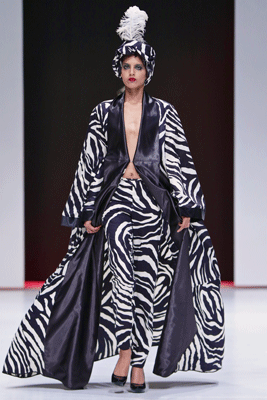
By Grant Moyo
Nkanyeziyethu Malunga Mkosana, the creative director of Ganu, an avant-garde brand that advocates for the use of indigenous knowledge systems (IKS) in textile and clothing production for economic sustainability, says her career in fashion and textiles was inspired by the need to share her culturally diverse and hybrid identity.
The well-travelled fashion designer attributes her unique ability to create authentic clothing and accessories to her upbringing in rural Matabeleland where she was exposed to the traditional way of life at a tender age.
“Growing up, we used to spend our holidays ekhaya [in rural areas], and we would watch our grandmother weaving icansi [mat], or working on the floors with ubulongwe [cow dung], which we normally had to collect to set up traps for birds with my twin sister,” Malunga Mkosana said.
“These are things I found fascinating and wished we could preserve. As I grew older, I realised that so much about our culture was disappearing and I wanted to contribute towards its preservation in an innovative and globally relevant manner.
“My early encounters with traditional textiles was also through my mother who at the time was a craft production officer and community development worker. I had a very adventurous childhood, as a kid. Relatives and friends used to call me to style their head wraps and they would ask me for style advice. As I grew older, I would attempt to make clothes for dolls. I was always drawing a dress or recycling some dresses. The need to share the diversity of our culture inspired me to promote cultural awareness and identity of where I come from through fashion and textiles, achieving this through a sustainable and environmentally friendly framework.”
Ganu creates luxury, sustainable fashion and accessories which include ready-to-wear collections, couture and home wear.
The brand’s pieces embrace traditional African designs and techniques such as weaving and dyeing. Staying true to her roots, Malunga Mkosana says the name Ganu was derived from an indigenous fruit amaganu, commonly known as the amarula.
- Chamisa under fire over US$120K donation
- Mavhunga puts DeMbare into Chibuku quarterfinals
- Pension funds bet on Cabora Bassa oilfields
- Councils defy govt fire tender directive
Keep Reading
“It was said to be a fruit of the gods, a fruit with so many powers,” she said.
“In fact, umganu is one of my favourite dyes. My designs capture a futuristic, timeless yet elegant. Each piece is handcrafted, handwoven by a team of women armed with skills as well as indigenous knowledge which is transferred to clothing and textiles. The Ganu woman embraces the sophistication and power of being an African in nature, tradition and origin.”
Representing cultural diversity through her outstanding fashion designs, Malunga Mkosana has graced prestigious events like the Intwasa Fashion Show (Zimbabwe), Durban Fashion Fair (South Africa), Mozambique Vodacom Fashion Week (Mozambique), and John Ablaza Show which was organised by the US Embassy (Zimbabwe), to name but a few.
In 2018 the fashion designer brought the dream as well as concept of “uMakoti” the Royal Bride Exhibition to life.
“Makoti Royal Bride Exhibition is about celebrating African queens and redefining fashion through cultural lenses, this being achieved through innovation and integrated cultural heritage, social entrepreneurship, and sustainability in fashion,” she said.
“The exhibition seeks to expose the cultural role of fashion in celebrating and honouring African women by showcasing authentic and culturally conscious bridal fashion. ‘UMakoti’ also seeks to display traditional fashion that interprets within a modern as well as urban historical context as well as cultural motifs, and virtue playing a role addressing the current demand for upmarket modern traditional bridal fashions.”
Having been selected to take part in the Mandela Washington Fellowship for young African leaders in 2017, she believes that there are many stories to tell about ourselves and so much indigenous knowledge to explore.
“Culture is not fixed, through conscious efforts it can conform to anything. The nature of our history has created a hybrid cultural concept which has left some Zimbabweans without a clear self-concept. Growing up, our grandmother would tell us folk tales, and looking back I realise the influence those mystical tales have on my creative designing. I come from a very matriarchal family, and I draw inspiration for the African couture range from women I have been exposed to,” Malunga Mkosana said.
Giving her insight into the opportunities given to local designers to access markets, she noted that unlike in South Africa and Nigeria where there are a number of initiatives that focus on developing a sustainable fashion industry, the local industry is yet to be realised as one of the major contributors to the country’s gross domestic product.
“What makes the fashion industry in those countries stand out is that they have high support and buy-in from the corporate sector as well as the government through policies and legislation. If we will have such a system in the country, we create a conducive value chain for fashion that meets both the producers and the consumers’ needs,” she said.
With the efforts taken by creatives to try and suppress the pandemic having been challenging psychologically, socially and financially, for Malunga Mkosana it has been a time to reflect and revisit the drawing board.
l Grant Moyo is a prolific writer, innovative media personality, entrepreneur and a creative artist. Follow him on Twitter: @TotemGrant











